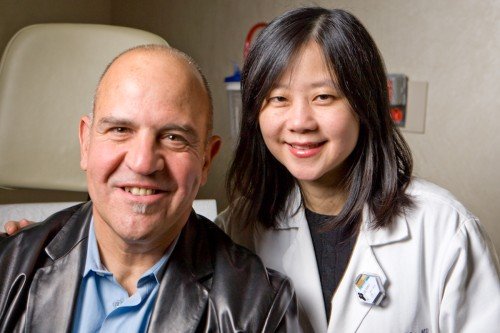Radiation therapy for throat cancer involves sending high-energy beams of particles through the skin toward the tumor. When the beams reach the tumor, they can destroy cancer cells by damaging their DNA. Radiation therapy is known for its particular effectiveness against head and neck tumors, including cancer of the throat.
Radiation therapy can be used in one of several ways to treat throat cancer. It may be recommended as the main treatment to destroy the tumor. In some cases, your care team may recommend radiation combined with chemotherapy to enhance the effectiveness of the treatment. Radiation may also be used to prevent the cancer from growing back after surgery or if the tumor has regrown after surgery.
The radiation therapy team at Memorial Sloan Kettering is highly experienced in caring for people with all types of throat cancer. We have access to every form of modern radiation therapy available and have special training in designing treatments especially for cancer of the head and neck. We work closely with the other members of your care team.
Your team of radiation experts will customize a treatment plan so precise that it factors in the size and shape of the tumor to the millimeter. Our goal is not only to eliminate the tumor cells but also to prevent the side effects of treatment by keeping the healthy cells around the tumor safe.
We offer several radiation therapy approaches for people with throat cancer. Among the most common at MSK are intensity-modulated radiation therapy and proton therapy. We also offer adaptive radiotherapy to all of our patients with throat cancer. Our team of experts is leading the way in developing new, more personalized approaches to treatment for people with HPV-positive oropharyngeal cancer.
Learn more about these specialized approaches.
Intensity-Modulated Radiation Therapy (IMRT)
IMRT allows your care team to shape the radiation beams to the exact dimensions of the treatment area.
Prior to the start of radiation therapy, a team of experts collects detailed information about the treatment area. This group includes radiation oncologists and experienced medical physicists. The details include:
- a CT scan to map the tumor in 3-D
- PET, CT, and MRI scans to generate an outline of the tumor
Your team uses this information along with sophisticated treatment-planning software to calculate the best number of radiation beams and the exact angles of those beams. During treatment, we use special tools to produce the beams at the angles specified by the treatment-planningsoftware.
This approach allows us to deliver more-precise doses of radiation to the tumor while reducing the risk that healthy tissue is exposed.
Proton Therapy
Proton therapy is a treatment approach that send a high-energy beam of protons through the skin toward the tumor.
Unlike the beams of radiation used in conventional radiation therapy, proton beams do not penetrate beyond the tumor. That’s why proton therapy reduces the likelihood of side effects caused by damage to normal tissue. Because there could be fewer side effects, proton therapy allows us to use a higher radiation dose on the tumor, maximizing the chance of destroying it.
Proton therapy has been extremely helpful for many people. Memorial Sloan Kettering is one of a limited number of centers nationwide that offer proton therapy.
Adaptive Radiotherapy
In conventional radiation treatment, your care team works together to formulate your treatment plan. This group includes radiation oncologists, radiation therapists, medical physicists, and treatment planners. Your team then carries out that plan during your course of treatment, which typically lasts six to seven weeks. Adaptive radiotherapy simply means that we repeat the planning process throughout your treatment. Every time we detect certain changes that could affect the precision of the radiation, we review your treatment plan. Changes we look for could be anything from weight loss to the tumor shrinking.
This personalized approach allows us to continually optimize your care while sparing healthy tissue. It is particularly beneficial for people who did not have surgery to remove a tumor.
Coping with Side Effects of Radiation to the Throat
The most common side effects of throat cancer treatment include:
- changes in your skin that look like a sunburn
- hoarseness
- changes in taste
- dryness of mouth
- weakening of the teeth
- pain, sores, or redness in the mouth
Our dental oncology team is available to support you with any problems that may arise with your teeth. We may also fit you with a custom mouth guard to protect your teeth during treatment.
Our rehabilitation team has extensive experience in helping people address the side effects of radiation therapy. A speech and swallowing specialist will meet with you before treatment to discuss any possible changes in your speech, voice, or swallowing. During and after treatment, we will provide you with exercises to prevent side effects, look out for any problems with swallowing, and make sure you are maintaining the range of motion in your tongue, jaw, and neck.
Until recently, many people with throat cancer had feeding tubes put in place to prevent complications related to swallowing. Today, the vast majority of our patients complete radiation treatment without a feeding tube. This is thanks in large part to the careful oversight of our speech and swallow therapists.
Request an Appointment
Available Monday through Friday, to (Eastern time)



